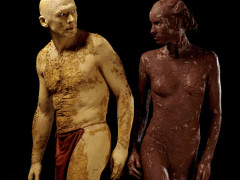Only God has dominion is the third objection Aquinas raises to the claim that humans naturally possessing things.
This is the continuation of my discussion of Aquinas on private property rights. ST II-II, 66, 1 (Summa Theologiae, Part II of Part II, Question 66, Objection 3.) in order The Full Text, Prologue / Beginning, Article 1, Objection 1, Objection 2
Objection 3 (this post), Aquinas’s Answer, Part I, Aquinas’s Answer, Part II. Aquinas, Aristotle and the Naturalness of Sustenance, Reply to Objections
Objection 3
Objection 3: Further, according to Ambrose (De Trin. i [De Fide, ad Gratianum, i, 1]) “dominion denotes power.” But man has no power over external things, since he can work no change in their nature. Therefore the possession of external things is not natural to man.
Aquinas now turns to a third objection to the view that humans naturally possess external things from nature. This objection is raised from the writing of St. Ambrose (340 – 397 CE), who was a bishop of Milan and one of the most influential ecclesiastical figures of the 4th century. Ambrose was a staunch opponent of Arianism, a third and fourth century heretical Christian movement that challenged the traditional understanding of the Trinity and claimed that Jesus Christ, the Son of God, is entirely distinct from and subordinate to the God the Father. Ambrose was asked by the Emperor Gratian to write a treatise proving the Divinity of Jesus Christ. The result was a treatise, which now forms the first two books of the De Fide. It is this work that Aquinas cites here.
Ambrose’s Objection
Let us start with understanding the objection that Aquinas ascribes to St Ambrose: “dominion denotes power.” We can discern its meaning by Aquinas’s brief comment that humans can’t work change in the nature of objects. Thus God has dominion over things because God can change them and control their nature. But humans can’t actually change things and therefore don’t have dominion over external things.
This third objection differs slightly from the first objection, which argued that God has ownership of everything and therefore humans can’t take possession of anything which belongs to God. Here, Ambrose is credited with saying that dominion means the power to change the nature of a substance. Since only God can change the nature of substances, humans therefore cannot be said to have “dominion.”
Now to some extent this objection seems to miss the point. Aquinas had originally posed the question “whether it is natural to man to possess external things?” He did not ask whether man has “dominion” over external things. Those seem like they might be different questions. So an opening is created here for Aquinas to make a counter argument, that while humans don’t have dominion (power over substance), they may naturally take possession and have use of external things. In other words, what God gives humans is the right to use and possess, not to have dominion and change the nature of substances.
One might want to engage Aquinas in debate after the discoveries of modern chemistry and genetics. For one could argue that boiling or freezing or even performing chemical reactions does have the power to change the nature of a substance. One wonders too how Aquinas might react to the fact that we can now make changes to DNA and modify substances. But that is a discussion for another time and place, when we are not just trying to understand what Aquinas means.
On our current understanding of Aquinas from this objection, the question naturally arises as to what God is understood to be saying in Genesis 1.26-28 about the relationship of the human to the natural world. Below are the relevant verses from Genesis for your convenience. We can see that twice humans are said (in the English translation) to have dominion over the creatures. I am drawing from the King James version of Genesis 1.26-28.
26 And God said, Let us make man in our image, after our likeness: and let them have dominion over the fish of the sea, and over the fowl of the air, and over the cattle, and over all the earth, and over every creeping thing that creepeth upon the earth.
27 So God created man in his own image, in the image of God created he him; male and female created he them.
28 And God blessed them, and God said unto them, Be fruitful, and multiply, and replenish the earth, and subdue it: and have dominion over the fish of the sea, and over the fowl of the air, and over every living thing that moveth upon the earth.
29 And God said, Behold, I have given you every herb bearing seed, which is upon the face of all the earth, and every tree, in the which is the fruit of a tree yielding seed; to you it shall be for meat.
We see here that the English word “dominion” is used twice in the translation to describe the relationship of the human creature to the other creations. The Hebrew word being translated is from the root RDH (רדה). If humans don’t have “dominion” over the world as Ambrose suggests, then what is the meaning of the word RDH [dominion] in the Hebrew original? One possibility is that Aquinas would say that the idea of “dominion” is not the proper translation and that it means something else. But if so what? And does that other meaning align with the Hebrew original?
Since Ambrose (on Aquinas’s interpretation) implies that humans don’t have dominion over the creatures or earth, how does he understand Genesis? What then does Scripture mean here? We shall return to these questions when Aquinas gives his own interpretation to see how he resolves the meaning of the Genesis passage.
Where Did St. Ambrose Say What He Said?
There is another perplexing problem with the objection that Aquinas attributes to Ambrose. I have been unable so far to find other interpreters who have noticed this problem. I refer to the fact that the quote “dominion denotes power” does not appear in the passage that Aquinas cites in the name of Ambrose. Readers who don’t care about picayune textual puzzles can skip on to Aquinas’s own response in the next section. Those who are interested in textual puzzles, hang with me here, because it is intriguing, ironic and, who knows, possibly significant.
I have checked a number of editions of Aquinas’s Summa Theologiæ, and almost all of them cite the Ambrose quote as coming from De Fide, ad Gratianum, i, 1, often translated as “Of the Faith.” [1]I have a longer extended discussion at the end of this post on this source But Ambrose’s De Fide does not deal with question of dominion in this meaning, nor does it say “dominion denotes power.”
The theme of De Fide is rather an argument against the Arian heresy that claims the Son is a separate entity than the Father. Ambrose’s tract is a refutation of that position, arguing the Son and the Father are one. The word “dominion” appears a few times in the work but none of the discussions seem pertinent to the context invoked here by Aquinas, at least as far as I can see.
So far, I have been unable to find the statement or concept that “dominion denotes power” in other parts of the Ambrose corpus. Nor does Ambrose talk about God’s command to Adam in Genesis 1.26-28 in his homilies on Genesis. Ambrose’s commentary on the Six Days of Creation (Hexaemeron) does talk about the sixth day of creation when the human is created (Homily 7 and 8) but does not discuss what Scripture means by the statement that humans shall have dominion over the creatures. When Ambrose does talk about Genesis 1.26 and the statement “Let us make man,” he suggests that the “us” refers to the Trinity, rather than angels or the soul.[2]Hexameron, Paradise, Cain and Abel (Fathers of the Church Patristic Series) by St. Ambrose. Translated by John J. Savage. Catholic University Press. 1961. An online version: … Continue reading
Could it be that Aquinas quoted Ambrose from memory or that the citation that came down to us is incorrect? I do not know all of the Ambrose corpus so I can’t be sure. Nonetheless, I have found that Ambrose has quite a bit to say on the subject of property elsewhere, especially in his On Duties of the Clergy. Here, Ambrose talks about property in words that seem quite relevant to the present context in Aquinas.[3]See On Duties of the Clergy, Chapter XXVIII, online http://www.ccel.org/ccel/schaff/npnf210.txt . See also a discussion of this passage in Ambrose in A History of Mediæval Political Theory in the … Continue reading Was Aquinas perhaps remembering such a passage from St. Ambrose? Let’s try to figure it out what Ambrose’s position is and whether it relates to the context here in Aquinas.
St. Ambrose on Dominion and the Stoics
The passage at hand from St Ambrose [quoted below] discusses the proper relationship of justice and property. Ambrose argues that the Stoic idea that the earth was given in common to human beings was derived from the Christian [and Jewish] sacred writings, that is Revelation. At issue, then, is who discovered the idea that the earth was given in common to human beings? Was it the pagan philosophers or the revelation as given in the sacred Scriptures? Ambrose’s answer is that the Stoics derived their ideas from Scripture.
But Ambrose then goes on to suggest that the Stoics drew an improper conclusion from that original insight. They assumed that justice could naturally embrace both public and private property. Here they made a mistake, says Ambrose. In point of fact, everything was given in common, but it was greed that turned some of it private.
This is an important statement, for Ambrose is arguing that everything was given in common and that it was the human condition and human nature that produced private property, not nature. Ambrose does not explain in this context how or why greed entered into the human condition. It is possible that Ambrose may mean that greed and thus private property arose out of the nature of the human condition after Adam and Eve’s sin and the Fall. In other words, the adoption of private property arose as a response to the changing nature of human beings after their sin and expulsion from Eden. This does not mean that Ambrose necessarily thinks private property is against justice, but only that it was not originally endorsed by God at creation.[4]See the discussion in Carlyle, Mediaeval Political Theory, 137. Here is Ambrose in his own words:
132. Next they [the Stoics] considered it consonant with justice that one should treat common, that is, public property as public, and private as private. But this is not even in accord with nature, for nature has poured forth all things for all men for common use. God has ordered all things to be produced, so that there should be food in common to all, and that the earth should be a common possession for all. Nature, therefore, has produced a common right for all, but greed has made it a right for a few. Here, too, we are told that the Stoics taught that all things which are produced on the earth are created for the use of men, but that men are born for the sake of men, so that mutually one may be of advantage to another. [Cic de Off. I. 9.]
After noting that the Stoics are wrong to think private property is authorized by nature, Ambrose goes on to make note of the Scriptural sources from which the Stoics derived their views.
133. But whence have they got such ideas but out of the holy Scriptures? For Moses wrote that God said: “Let us make man in our image, after our likeness, and let them have dominion over the fish of the sea, and over the fowl of the air, and over the cattle, and over every creeping thing that creepeth upon the earth.” [Gen i. 26.] And David said: “Thou hast put all things under his feet; all sheep and oxen, yea, and the beasts of the field, the fowls of the air, and the fishes of the sea.” [Ps. viii. 7, 8]. So these philosophers have learnt from our writings that all things were made subject to man, and, therefore, they think that all things were produced also for man’s sake.
Ambrose is claiming that the Stoics based their understanding of common property on the creation narrative and the passage about dominion (Gen 1.26 ) as well as a Psalm of David. But the Stoics then misinterpreted Scripture and assumed incorrectly that because humans were said to have dominion over the creatures, that all things were produced for the sake of humans, a point with which Ambrose disagrees. Ambrose apparently holds that not everything was created “for man’s sake.”
The Ambrose discussion is fascinating because it is very pertinent to Aquinas’s discussion on taking possession of external things. Ambrose is taking the position that that “dominion” means humans were given the earth in common to use and possess but that they were not authorized by God to have private property. Private property arose after being expelled from Paradise. In Paradise, there was no private property. This position would seemingly suggest that Ambrose and Aquinas may not in the end be that far apart, even though Ambrose is portrayed by Aquinas as having an objection to the idea that humans have “dominion.”
Perhaps another scholar will discover an Ambrose quote that says “dominion denotes power.” But if not, we are left wondering whether Aquinas mistakenly remembered Ambrose’s position or wanted to downplay the fact that his own position was quite similar to that of the earlier saint. Perhaps, in the end, the answer is not that important. But it is still interesting and intriguing as part of the history of ideas on property.
Next we consider Aquinas’s own position and his answer to the objections.
********************
Additional Notes
<1> A translation of De Fide can be found here. http://www.ccel.org/ccel/schaff/npnf210.html. Ambrose: Select Works and Letters. Translated by The Rev. H. De Romestin, M.A.. T&T Clark. Edinburgh. WM. B. Eerdmans Publishing. Grand Rapids, MI.
I have looked through a number of books on Aquinas’s Summa Theologiæ and none seem to be pick up on the problematic nature of the Ambrose citation or notes it as an issue. See, for example, ST Thomas Aquinas, Summa Theologiæ, New York: BlackFriars with McGraw-Hill, Vol. 38, 1975, p. 63 which cites the following De Fide I, I. PL 16, 530. See also On Law, Morality and Politics, 2nd Ed. Trans. Richard J. Regan, edited by William P. Baumgarth and Richard J. Reagan. Hackett Publishing Company, 2002. which says in footnote two: “Actually, On Faith I, 1, n. 7 (PL 16:530).” See, Kindle Edition Loc. 3597 and footnote 2 Kindle Loc. 3851).
The abbreviation PL refers to J. P. Migne, Patrologica Latina. Some translations have a different citation of Ambrose’s statement. They cite the source as “On the Trinity” or De Trinitate I:I (PL 15:553). De Trinitate is the name for both De Fide plus three additional books on the Holy Spirit (De Spiritu Sancto). But I’ve looked in De Spiritu Sancto as well and have found no quote that resembles the one Aquinas attributes to Ambrose. For examples of this citation, see, for example, Michael Morgan’s Classics of Moral and Political Theory. 5th Ed. Edited by Michael L. Morgan. Hackett Publishing, 2011, 488 and Aquinas: Political Writings. Edited by R. W. Dyson. Cambridge University, 2002, 206. Those who want to peruse De Fide, can do so her online and here. Below appears to be the passage that Aquinas is supposedly citing from in De Fide. In my view, this passage can’t be the justification for the position ascribed to Ambrose that “dominion denotes power.”
- NOW this is the declaration of our Faith, that we say that God is One, neither dividing His Son from Him, as do the heathen,1672 nor denying, with the Jews, that He was begotten of the Father before all worlds,1673 and afterwards born of the Virgin; nor yet, like Sabellius,1674 confounding the Father with the Word, and so maintaining that Father and Son are one and the same Person; nor again, as doth Photinus,1675 holding that the Son first came into existence in the Virgin’s womb: nor believing, with Arius,1676 in a number of diverse Powers,1677 and so, like the benighted heathen, making out more than one God. For it is written: “Hear, O Israel: the Lord thy God is one God.”1678
- For God and Lord is a name of majesty, a name of power, even as God Himself saith: “The Lord is My name,”1679 and as in another place the prophet declareth: “The Lord Almighty is His name.”1680 God is He, therefore, and Lord, either because His rule is over all, or because He beholdeth all things, and is feared by all, without difference.
Source. De Fide, Trans. by H. de Romestin, E. de Romestin and H.T.F. Duckworth. From Nicene and Post-Nicene Fathers, 2nd Series, Vol. 10. Edited by Philip Schaff and Henry Wace. Buffalo, NY: Christian Literature Publishing Co., 1896.) Revised and edited for New Advent by Kevin Knight.
<2> Here is the longer quote from Ambrose on the question of common property.
Chapter XXVIII.
A community rests upon justice and good-will. Two parts of the former, revenge and private possession, are not recognized by Christians. What the Stoics say about common property and mutual help has been borrowed from the sacred writings. The greatness of the glory of justice, and what hinders access to it. 130. Justice, [191] then, has to do with the society of the human race, and the community at large. For that which holds society together is divided into two parts,–justice and good-will, which also is called liberality and kindness. Justice seems to me the loftier, liberality the more pleasing, of the two. The one gives judgment, the other shows goodness…
- Next they [the Stoics] considered it consonant with justice that one should treat common, that is, public property as public, and private as private. But this is not even in accord with nature, for nature has poured forth all things for all men for common use. God has ordered all things to be produced, so that there should be food in common to all, and that the earth should be a common possession for all. Nature, therefore, has produced a common right for all, but greed has made it a right for a few. Here, too, we are told that the Stoics taught that all things which are produced on the earth are created for the use of men, but that men are born for the sake of men, so that mutually one may be of advantage to another. [193] [Cic de Off. I. 9.]
- But whence have they got such ideas but out of the holy Scriptures? For Moses wrote that God said: “Let us make man in our image, after our likeness, and let them have dominion over the fish of the sea, and over the fowl of the air, and over the cattle, and over every creeping thing that creepeth upon the earth.” [194] [Gen i. 26. And David said: “Thou hast put all things under his feet; all sheep and oxen, yea, and the beasts of the field, the fowls of the air, and the fishes of the sea.” [195] Ps. viii. 7, 8. So these philosophers have learnt from our writings that all things were made subject to man, and, therefore, they think that all things were produced also for man’s sake.
References
| ↑1 | I have a longer extended discussion at the end of this post on this source |
|---|---|
| ↑2 | Hexameron, Paradise, Cain and Abel (Fathers of the Church Patristic Series) by St. Ambrose. Translated by John J. Savage. Catholic University Press. 1961. An online version: https://archive.org/stream/fathersofthechur027571mbp/fathersofthechur027571mbp_djvu.txt |
| ↑3 | See On Duties of the Clergy, Chapter XXVIII, online http://www.ccel.org/ccel/schaff/npnf210.txt . See also a discussion of this passage in Ambrose in A History of Mediæval Political Theory in the West, Volume 1. By Sir Robert Warrand Carlyle, Alexander James Carlyle. London: Ambrose William Blackwood and Sons, 137 (Kindle loc 2139), Available online. |
| ↑4 | See the discussion in Carlyle, Mediaeval Political Theory, 137. |




